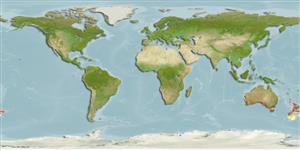Common names from other countries
Teleostei (teleosts) >
Gadiformes (Cods) >
Macrouridae (Grenadiers or rattails)
Etymology: Coelorinchus: Greek, koilos = a hollow + Greek, rhyngchos = jaw (Ref. 45335).
Environment: milieu / climate zone / depth range / distribution range
Ecology
Marine; bathydemersal; depth range ? - 483 m (Ref. 58018). Deep-water
Southwest Pacific: Australia (including Tasmania) and New Zealand.
Size / Weight / Age
Maturity: Lm ? range ? - ? cm
Max length : 39.9 cm TL male/unsexed; (Ref. 26363)
Dorsal spines (total): 2. About 11 greyish brown dorsal saddle marks (indistinct posteriorly), commencing predorsally, the fifth saddle noticeably darker (brownish black); a narrow, black stripe of pigmentation running along anal fin near the ventral margin of the fin, indistinct anteriorly and posteriorly, darkest midway along fin; upper two-thirds of first dorsal fin darkly pigmented; ventral surface of head and lower jaw naked; small, oval dermal window of light organ separated from anus by one or two scale rows; orbit oval, large 31.8-43.6% HL; pyloric caeca 2-32 (Ref. 26363). Similar to a number of species (C. mystax, C. bollonsi, C. parvifasciatus, C. fasciatus, and C. cookianus) but may be differentiated from each other based on the pigmentation on the body or fins and in pyloric caeca counts, among other characters (Ref. 26363).
A benthic species (Ref. 75154) which inhabits upper slopes (Ref. 26363).
Life cycle and mating behavior
Maturities | Reproduction | Spawnings | Egg(s) | Fecundities | Larvae
McMillan, P.J. and C.D. Paulin, 1993. Description of nine new species of rattails of the genus Caelorinchus (Pisces, Macrouridae) from New Zealand. Copeia 1993(3):819-840. (Ref. 26363)
IUCN Red List Status (Ref. 130435)
CITES (Ref. 128078)
Not Evaluated
Threat to humans
Harmless
Human uses
Tools
Special reports
Download XML
Internet sources
Estimates based on models
Preferred temperature (Ref.
115969): 9.2 - 13.6, mean 11.9 (based on 38 cells).
Phylogenetic diversity index (Ref.
82804): PD
50 = 0.5000 [Uniqueness, from 0.5 = low to 2.0 = high].
Bayesian length-weight: a=0.00251 (0.00128 - 0.00492), b=3.19 (3.03 - 3.35), in cm Total Length, based on LWR estimates for this Genus-body shape (Ref.
93245).
Trophic level (Ref.
69278): 3.5 ±0.5 se; based on size and trophs of closest relatives
Resilience (Ref.
120179): Low, minimum population doubling time 4.5 - 14 years (Preliminary K or Fecundity.).
Fishing Vulnerability (Ref.
59153): Low to moderate vulnerability (30 of 100).
